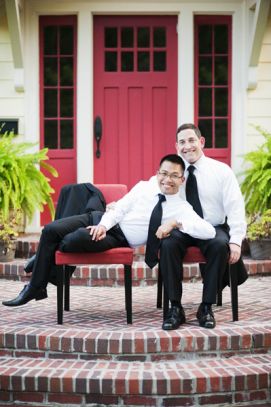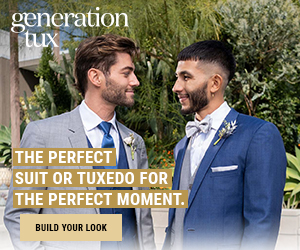
Newly married couples are giving nontraditional spins to the family name.

What’s in a name?
That’s the argument that many opponents to marriage equality attempt to make for the marriage versus civil union debate. But for those of us who are on the brink of creating a new family, a name carries with it deep significance, whether that’s in the defining nature of a relationship, or the literal translation of the term: the last name.
As we wind along the messy legislative paths to marriage equality, LGBTQ couples are forced to overcome a multitude of logistical and emotional hurdles. In states that legally recognize same-sex marriages, it’s simply a matter of changing the name on the marriage certificate, saving the couple court costs of up to $400, an extensive newspaper notification process, as well as time spent waiting on a judge to approve the name change. “Ultimately though, no state will prevent a name change, as long as it’s not fraudulent,” explains Kelly Utt-Grubb, Founder and Principal of Name Counsel, who offers personal naming consultations. She has worked with several gay and lesbian couples on creating a new surname after marriage, as well as transgender individuals choosing a new name after their transition.
Of course, along with the pervasive process, there’s the issue of what the name should be changed to.
Utt-Grubb’s extensive research has revealed that same-sex couples often opt to keep their own names going into the marriage, only to change once a child is introduced. However, as of late, due to marriage equality sweeping the states, she’s noticing a rising trend in creating a family name even before children are involved. With no traditions to follow, today’s LGBTQ couples are paving the way, tacking on nontraditional options such as combination names, hyphenated names and new names altogether, while battling the emotional issues that come with a new identity.
“I often spend a lot of time helping same-sex couples sort through family of origin-related emotional issues in order to leave behind what has been hurtful and negative and to carry on the good. Unfortunately, many gay and lesbian individuals have been rejected and mistreated by relatives, and that is a big deal,” explains Utt-Grubb. “The positive side is that there are often one or two relatives who were always very supportive, and it can be very meaningful to include the name of that relative somehow.”
 With the tides turning in the social views of last names, couples can feel more at ease when approaching a judge about a last name request. “While some are totally comfortable being themselves and making decisions without regard to what other people think, many of these individuals are hesitant. This is especially true if their families will likely react badly. Part of my process is helping them to get a handle on their own comfort level with these issues,” explains Utt-Grubb. “I’ve heard from many people, gay and straight, who assume that ridicule accompanies a nontraditional last name choice. When considering the choice for themselves, a significant number imagine that there is a social penalty attached, but research indicates that is simply not so.” A 2002 academic study of heterosexual marriages conducted by researchers at Millikin University further indicated that nontraditional naming is viewed as a positive phenomenon. Researchers in that study found that married men and women with hyphenated last names were perceived differently than other people, but in generally positive terms. There has been debate about whether there should be space on marriage licenses for name changes other than the woman changing it to her husband’s in order to umbrella all couples’ last name adjustments.
With the tides turning in the social views of last names, couples can feel more at ease when approaching a judge about a last name request. “While some are totally comfortable being themselves and making decisions without regard to what other people think, many of these individuals are hesitant. This is especially true if their families will likely react badly. Part of my process is helping them to get a handle on their own comfort level with these issues,” explains Utt-Grubb. “I’ve heard from many people, gay and straight, who assume that ridicule accompanies a nontraditional last name choice. When considering the choice for themselves, a significant number imagine that there is a social penalty attached, but research indicates that is simply not so.” A 2002 academic study of heterosexual marriages conducted by researchers at Millikin University further indicated that nontraditional naming is viewed as a positive phenomenon. Researchers in that study found that married men and women with hyphenated last names were perceived differently than other people, but in generally positive terms. There has been debate about whether there should be space on marriage licenses for name changes other than the woman changing it to her husband’s in order to umbrella all couples’ last name adjustments.
“This disposes of the rule that the male surname is the marital name to the same trash bin where dowries were once tossed out,” said Mark Rosenbaum, legal director of the Southern California chapter of the American Civil Liberties Union, who worked on a lawsuit that resulted in Californians now having the right to take on the name of their spouses and partners, regardless of gender.
The slow release of the stigma from society’s outlook on nontraditional last names proves that we’re moving forward, as a country, in acceptance of all, giving us the right to sign our John Hancock as Mr. and Mr. Smith.
Photo: Real Weddings Glenn and Michael, photography by Kyle Bromley
staff
MOST VIEWED STORIES
- These nonbinary cosplay lovers brought anime to life for their ethereal wedding
- Sweet lesbian proposal on a gondola [VIDEO]
- Navy and green wedding for Disney lovers in Beacon, New York
- Ensuring Inclusivity: 5 Considerations for Guests with Disabilities on Your Wedding Day
- Greenhouse wedding in Downtown Los Angeles for two brides



























